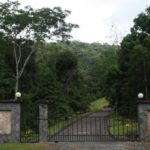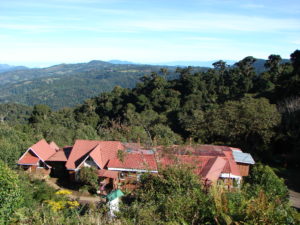 Join us in Spring 2020 for an exploration of the ecology, biodiversity and culture of Costa Rica, designed especially for students in the natural sciences.
Join us in Spring 2020 for an exploration of the ecology, biodiversity and culture of Costa Rica, designed especially for students in the natural sciences.
Explore National Parks, beaches, and rivers, work with local communities, go Ziplining, study rainforest ecology, speak Spanish, learn from indigenous leaders, and see sloths, macaws, monkeys, toucans, peccaries, red-eyed treefrogs, morpho butterflies, crocodiles, and more.
This full semester program is open to students of all majors interested in the natural sciences. The program is geared for Sophomores but outstanding Freshmen and Juniors who need to take the courses are encouraged to apply.
Dates (Approximate)
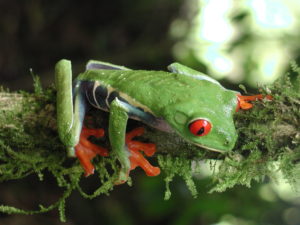 Students will need to arrive in Costa Rica on or before 12 January 2020 and the semester activities will end on approximately 2 May 2020. These dates are still approximate and may change slightly.
Students will need to arrive in Costa Rica on or before 12 January 2020 and the semester activities will end on approximately 2 May 2020. These dates are still approximate and may change slightly.
Student Life
The course will be based at the Soltis Center where students will eat three cafeteria-style meals a day and live in shared dorm accommodations. The program itinerary is created to intersperse intense periods of lectures and exams with multi day trips and field excursions to ensure that the basic lecture material is covered while still finding time to explore the unique opportunities available in Costa Rica. We will also do a quick trip in to Panama to explore new environments and the differences among Latin American nations. Students will learn about local cultures through a series of homestays with families in distinct areas of the country. Throughout the semester the course will usually be traveling during the weekends and time will be included for relaxation and exploration of beaches, forests, national parks, and cities.
The Soltis Center
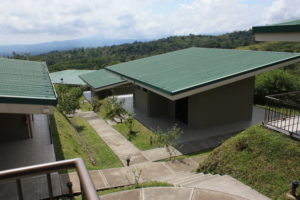 The Soltis Center for Research and Education is a Texas A&M owned and operated facility which opened in 2009. The modern facilities of the center include dorms, a cafeteria and multiple use area, labs, classrooms, internet access, and a video conference room, all wheel chair accessible, along with more than 250 acres of primary and second growth tropical rain forest. The forests host diverse plant, bird, and amphibian communities which provide a wide array of educational and research opportunities. The closest community, San Juan de Peñas Blancas, is just five minutes away from the center, where approximately 50 families form a close-knit community reliant mostly on subsistence farming. The land owners around the center are an eclectic mix of US expatriates and native Costa Ricans who are using their land for sustainable agriculture, forestry, organic farming, cattle grazing, tourism and other micro enterprises. The center is about 30 minutes from the popular tourist destinations of La Fortuna, Arenal Volcano and Arenal Lake.
The Soltis Center for Research and Education is a Texas A&M owned and operated facility which opened in 2009. The modern facilities of the center include dorms, a cafeteria and multiple use area, labs, classrooms, internet access, and a video conference room, all wheel chair accessible, along with more than 250 acres of primary and second growth tropical rain forest. The forests host diverse plant, bird, and amphibian communities which provide a wide array of educational and research opportunities. The closest community, San Juan de Peñas Blancas, is just five minutes away from the center, where approximately 50 families form a close-knit community reliant mostly on subsistence farming. The land owners around the center are an eclectic mix of US expatriates and native Costa Ricans who are using their land for sustainable agriculture, forestry, organic farming, cattle grazing, tourism and other micro enterprises. The center is about 30 minutes from the popular tourist destinations of La Fortuna, Arenal Volcano and Arenal Lake.
Excursions
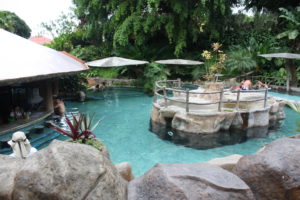 Throughout the program we will make use of the wide array of ecosystems, parks, and cultural opportunities to provide a mix of educational tours and unique cultural experiences while still finding time for a mix of relaxation and adventure travel. We plan to visit tropical rainforests, beaches, tropical dry forests, volcanoes, cloud forests, wetlands, mountains, lowlands, and the capital of San Jose. Some of our destinations will include Manuel Anontio National Park (beach), Monteverde (cloud forest), La Selva Biological Station (rainforest), Palo Verde Biological Station (dry forest), Hacienda Guachipilin (ziplining and horseback riding), Cerro de la Muerte (montane forests), and Poas (volcano).
Throughout the program we will make use of the wide array of ecosystems, parks, and cultural opportunities to provide a mix of educational tours and unique cultural experiences while still finding time for a mix of relaxation and adventure travel. We plan to visit tropical rainforests, beaches, tropical dry forests, volcanoes, cloud forests, wetlands, mountains, lowlands, and the capital of San Jose. Some of our destinations will include Manuel Anontio National Park (beach), Monteverde (cloud forest), La Selva Biological Station (rainforest), Palo Verde Biological Station (dry forest), Hacienda Guachipilin (ziplining and horseback riding), Cerro de la Muerte (montane forests), and Poas (volcano).
We also plan to visit the Naso Indigenous people in Panama to learn from them about how they view culture, health, agriculture and the environment. Then after this we will jump over to the beaches of Bocas del Toro, Panama for some well-earned relaxation.
Prerequisites
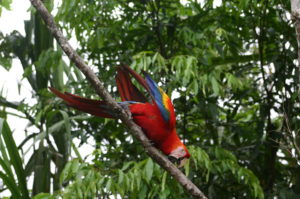 The course is designed for Sophomores with an interest in the natural sciences. It is specifically designed for those who need to take Ecology (RENR 205 / 2015).
The course is designed for Sophomores with an interest in the natural sciences. It is specifically designed for those who need to take Ecology (RENR 205 / 2015).
Other requirements include
- Minimum 2.5 GPA
- Instructor approval
- Sophomore standing at the time of the course
Courses
Through this program, students will earn 13 TAMU credits and be eligible for 3 transfer credits in Spanish. The courses will include:
Fundamentals of Ecology*
RENR 205 | Instructor: Donald J. Brightsmith (with Ronald Vargas, Eugenio Gonzalez, Mariana Mateos & Ben Wu) | 3 credits
This lecture and assignment-based course will introduce both temperate and tropical ecology through a series of lectures, assignments, and independent projects that take advantage of the rich biodiversity of Costa Rica. Lectures will be given by a mix of TAMU faculty and Soltis Center’s Costa Rican faculty and staff. Each student will conduct and write a major independent study project, guided by local faculty and staff in Costa Rica.
*Students who have taken RENR 205 will be able to take a 3 credit, 485 “Directed Study In Costa Rica” course instead of RENR 205.
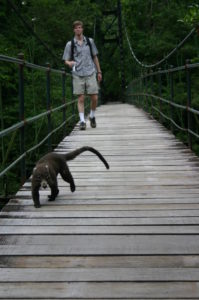 Fundamentals of Ecology Lab
Fundamentals of Ecology Lab
RENR 215 | Instructor: Donald J. Brightsmith (with Ronald Vargas and Eugenio Gonzalez) | 1 credit
This lab-based course will help students see, through real-world examples, the foundational concepts in Ecology. Most laboratories will be field based and will be carried out in a wide array of different sites throughout the tropical forests and wetlands of Costa Rica. We will likely conduct laboratories in at least four distinct tropical life zones including: Lowland Wet Forest, Lowland Dry Forest, Montane Wet Forest, and Paramo. This exposure will provide students with a broad array of ecological contexts to use when analyzing future ecological problems.
Technical Writing
ENGL 210 Writing Intensive | Instructor: Matthew McKinney | 3 credits
All semester program students will be guaranteed a spot in this course that is notoriously difficult to get into. Even more importantly, all the semester program students will be in the same exclusive section, and all the assignments, lectures, etc. will be directly relevant to our work in Costa Rica and to students studying for careers in the natural sciences. The course will be taught online, with a mix of in person lectures and meetings scheduled when the professor is in Costa Rica. Writing assignments will also integrate with and reinforce material from the Ecology and other semester courses to help ensure students get the most out of their work in Costa Rica.
Insects in Human Society
ENTO 322 | Instructor: Craig Coates | 3 credits
This online course will explore the interrelationships between humans and insects and will be tailored to fit the realities of living and studying in Costa Rica. Students will choose from the large array of incredible tropical insects when creating their required collections. Students will also do group projects which look at how local people around the Soltis Center are interacting with key insects.
Cultural Discourse in Costa Rica
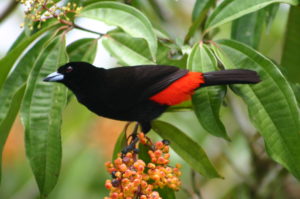 VTPB 289 International and Cultural Diversity Course | Instructor: Donald J. Brightsmith | 3 credits
VTPB 289 International and Cultural Diversity Course | Instructor: Donald J. Brightsmith | 3 credits
This course will be led by a mixture of Costa Rican and TAMU faculty with a broad array of experience working and living in Latin America and the USA. Students will explore the culture of Costa Rica and Panama through a mixture of homestays with local people, field trips, and cultural tours. These experiences will be put in to context and compared and contrasted with culture in the USA through a series of reflective discussions and short written assignments.
Spanish Language
Level depends upon your abilities | 3 credits
Spanish will be taught by the Centro Panamericana de Idiomas. Students will receive intense immersion training with 4 hours of class per day for a total of three weeks. Classes will be extremely small (1 to 5 students) to ensure that all students are in a class at the appropriate level for their abilities, and to make sure everyone gets a chance to speak and participate fully during class. We will study at CPI campuses in both Monteverde and Heredia (a suburb of the capital of San Jose).
Service Learning
Students will complete a 16-hour service learning opportunity with the help of Cory Arcak of the MSC LT Jordan Institute for International Awareness. Through this, students will gain new insights in to cultural similarities and differences and learn new ways to bridge cultural differences and positively impact local people.
For more information
If you want more information make sure you get on the mailing list by emailing Corinne Beverly at cbeverly@tamu.edu. We will provide more information about the program as it becomes available.
Applications
Applications will be opening Summer or early Fall 2019 with the semester starting in January 2020. So, if you are a Freshman now, plan on joining us next year in Costa Rica.
Costs (Estimates)
The following costs are based on schedules from similar semester programs and are intended for general guidelines only. Spring 2020 is the first time this study abroad experience is being offered.
| Estimated Program Fee (subject to change) – billed to university account | $11,600 | |
| Accommodations, Most meals, Excursions & other Program Related Expenses | $6,300 | |
| In-Country Transportation | $1,200 | |
| CISI International Health Insurance | $125 | |
| Study Abroad Administrative Fee | $510 | |
| Miscellaneous Program Expenses (tips, wire transfers, other) | $1,465 | |
| Additional Expenses – not included in program fee | $6,685 | |
| Tuition & Fees (in-state resident for 13 credit hours | $4,250 | |
| International Airfares | $800 | |
| Travel Documents (passport and visa if needed) | $135 | |
| Some Meals (those not included in program fee) | $1,000 | |
| Textbooks & Supplies | $500 | |
| Personal Spending | Varies | |
| Total Estimated Cost | $18,285 | |

